"Will I Want to Do This Again?" and Other First Comp Questions
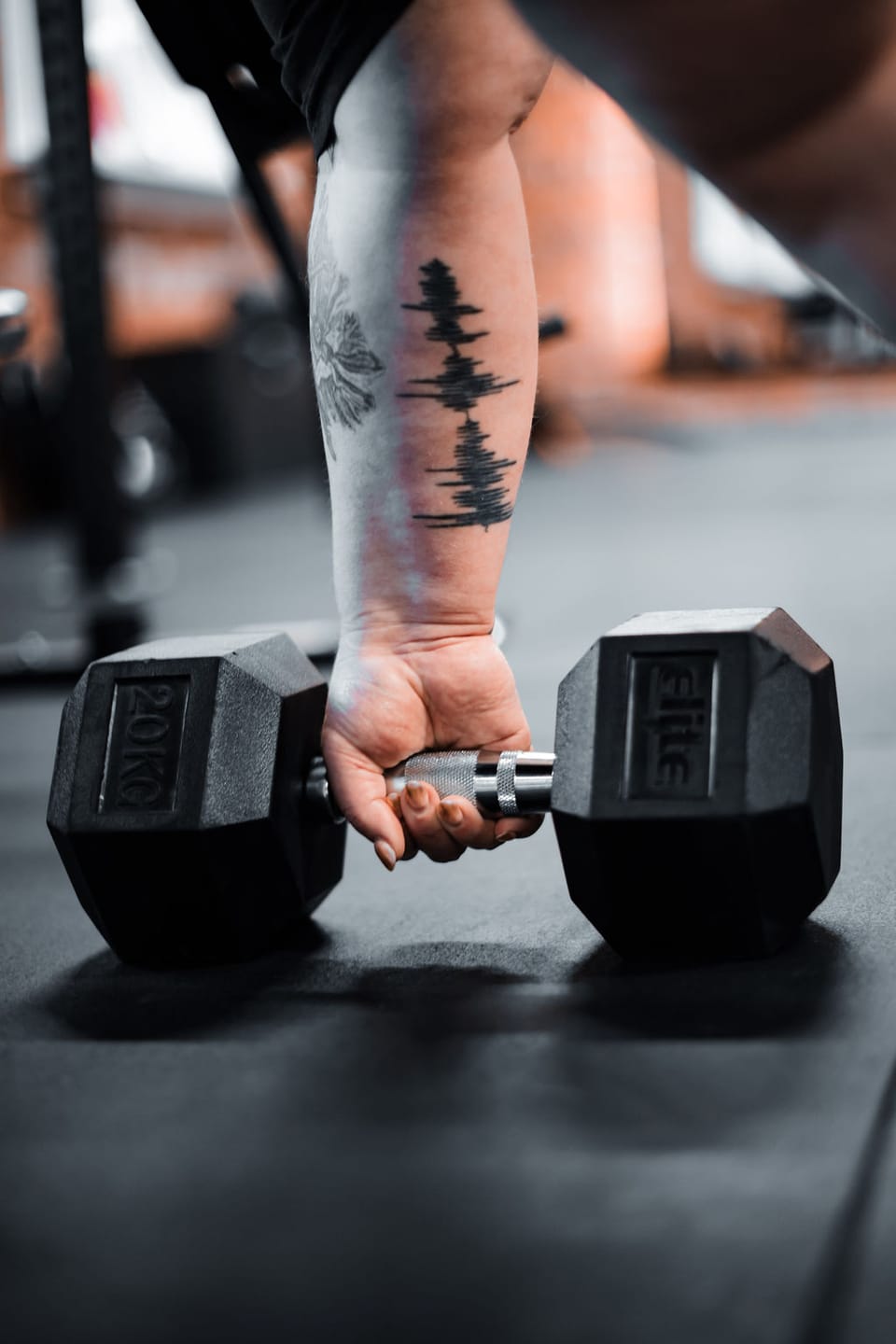
By the time you read this, we will be packed up, deloaded, and prepping to head to Fielding to lift our little brains out.
Because a powerlifting competition is a much more technical thing than we realised, we enlisted the help of a friend. Mon Leather is a competitive powerlifter, a referee, and an all round excellent human. She’s one of those people who likes to be part of the community and help out.
Mon was kind enough to send us a 2,500 word email of rules* , tips, and things to think about. But we also commandeered her attention for an hour to ask all our dumb questions. We thought, for anyone who is also attempting their first competition, or who’s just curious about the process, we’d share it.
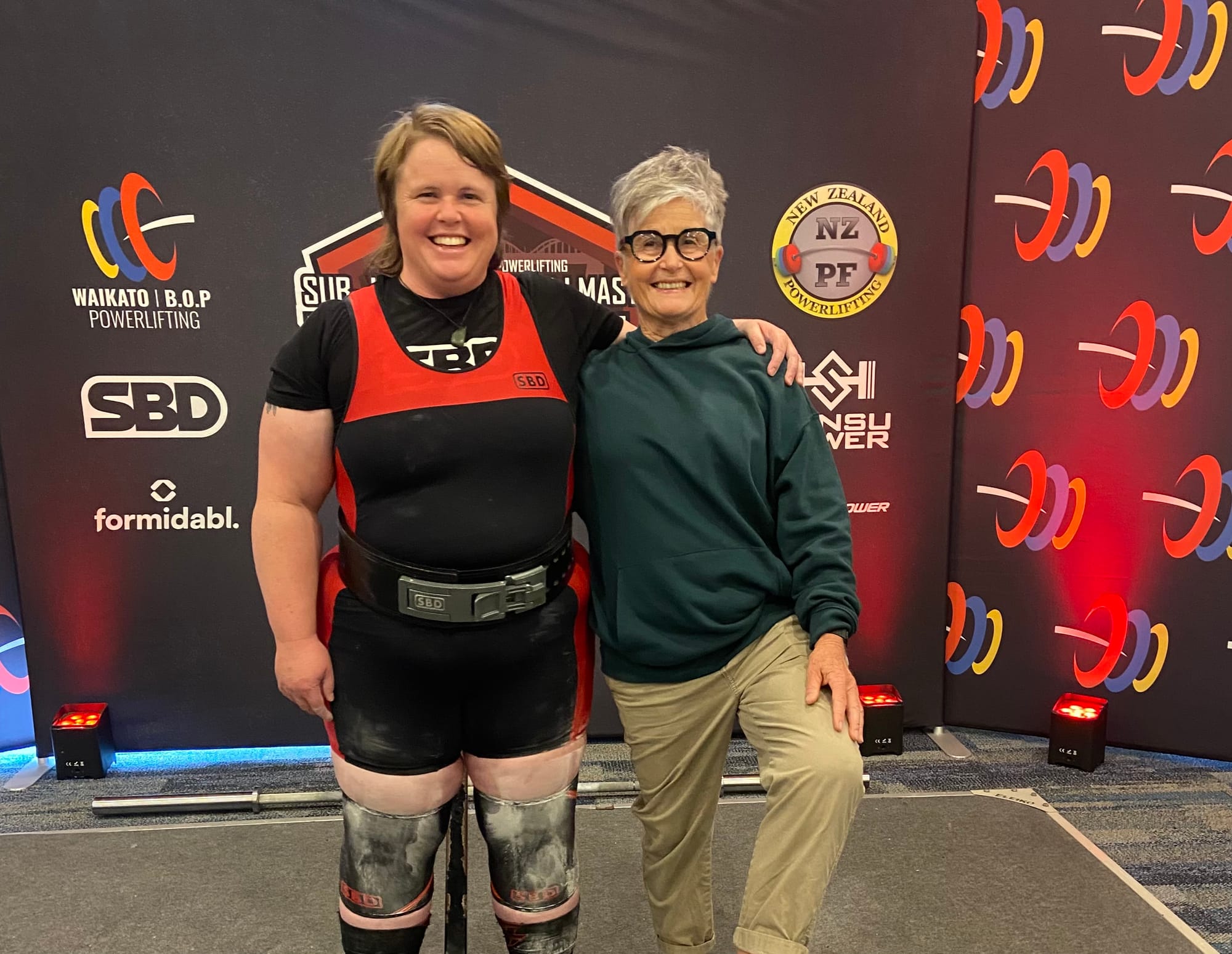
*We are competing in WCPA which is affiliated to IPF. The following refers to IPF rules, but other federations are available.
Megan: What is it about the competition vibe that you like? Because I am terrified.
Mon: It really does feel like a community. Sometimes you have to push past the fact that some people seem quite staunch—but often that’s just nerves. People are nervous, and they want to have a good time.
The first couple of times I competed, I found it absolutely terrifying. But once I figured out the weird little protocols and quirks of how competitions work—well, at first they’re a mystery, and they’re scary. But once you get the hang of them, it gets easier.
And then I felt like I could help other people. You know, you walk in, spot someone who looks terrified and who you’ve never seen before, and go: “Come with me. I’ll show you what to do.” You explain how weigh-in works, where to put your stuff, how to warm up—it just becomes something you can pass on.
I’ve seen people come to their first comp absolutely terrified—they’d forgotten their socks, they were overwhelmed, just having a really scary first experience. And now? Some of them have gone on to become champions. They’ve totally surpassed me in lifting.
It’s such an accessible sport. My experience - no matter where I’ve been - has always been the same: just good people who love the sport and give so much of their time to it.
Sure, everyone’s got their reasons for doing it, their own goals—but at the end of the day, everyone just wants people to have a good time and enjoy the sport. There’s not a lot of gatekeeping. It’s open, it’s welcoming, and it’s all out there for anyone who wants to be part of it.
Carl: Do you remember your first competition? And if you do was there anything that surprised you that that you weren't prepared for?
Mon: I learn something every time I compete, and that’s kind of why I keep doing it. The weight increases aren’t always huge—sometimes they’re tiny—but I always come away with something new, whether it’s about myself, my mindset, or how I manage energy.
It’s made me think about motivation too—like, am I really letting myself care about this, or am I pretending I don’t? Am I showing up fully, or holding back a bit? I’ve also learned a lot about energy management—how much I can actually control my mindset… or not.
At my first comp, I had the classic food mistake. It was a bit overwhelming, and I just remember stuffing myself with sandwiches because I thought I needed heaps of fuel. I ate so much volume I ended up bloated and could barely bend down for my deadlift. Rookie error.

And you know, these comps are such a mix. I remember seeing this woman at one of my first novice competitions—she was clearly very high level. You get that sometimes: novice comps where there are absolute beginners and then people who are literally world champions. It’s one of the cool things about it, honestly. Everyone’s in the same room, on the same platform.
That first competition I remember seeing this a woman who was just clearly very experienced, really, really strong, like, amazing, but she was also so joyful. She was having such a good time.And like she was saying, she was listening to her music. She was swinging her legs. She totally knew what she was there for, and she was really in the zone.
Megan: That’s kind of the vibe I want to bring - just be there to enjoy it, because I don’t want to let my competitiveness ruin it (She says, having tweaked a muscle in her back because she couldn’t walk away from a loaded bar)
Mon: Yeah, it's a really tough sport. It's a really tough sport because everyone says it’s all you. You just compete against yourself. But at the end, they do rank you.
But yeah, they’re really nice events. Backstage, sure—there’ll be people who are just doing their own thing, staying in their zone. But if you’re up for connecting with others, just give it a go. There are always plenty of people who are keen for a bit of a chat or some connection.
Megan: You just mentioned backstage. So there's a space to like warm up and do **** backstage?
Mon: Sometimes it's not hidden, so if it's in a gym, it could just be wide open. If it’s a one-platform comp, sometimes they put up a wee partition, and the warm-up area is just off to the side. They’ll usually have a few racks—maybe two, three, sometimes four—set up for warm-ups. The platform itself is out front, with rows of folding chairs for the audience.
I used to get really excited at competitions—it’s such a stimulating environment. I’d run around, cheer for everyone, watch every single lift...But I started to realise I was probably draining myself without noticing. Sometimes, you just need to take a moment, pull back a bit, and collect yourself.
Sometimes there’s a partition between the warm-up area and the platform, sometimes not—so technically, people could turn around and watch you warm up. But honestly, they’re usually not that interested.
At a novice comp, there’s not a lot of fanfare or big staging. It’s pretty low-key, which can actually be kind of nice.
Megan: One question I have—for someone who’s done this a bunch of times, Mon—I’ve never, that I can remember, actually tried to do all three of my lifts in one day. Maybe two, but never all three. You’ve talked before about learning to manage your energy—how do you actually do that?
Mon: Practice. Honestly, that’s the biggest thing. It took me a while to learn.
Like I said before—stuffing myself with sandwiches definitely wasn’t the move! For me, it’s been about figuring out what I actually need to eat. And my short answer is: eat what you normally eat before going to the gym. Stick with what’s familiar.
I have a lot of lollies, lots of glucose. Sometimes I get sick of all the sweet stuff, so I’ll switch it up—maybe rice crackers, and a little protein shake. Just enough to keep me from feeling hollow.
Not eating much protein on comp day works for me—but again, it’s really personal. The key thing is making sure you’ve got available energy when you need it.
There are other parts of energy management too, and a big one is being intentional about where you spend your energy. For example, I used to get really excited at competitions—it’s such a stimulating environment. I’d run around, cheer for everyone, watch every single lift, and just generally be in it the whole time.
But I started to realise I was probably draining myself without noticing. Sometimes, you just need to take a moment, pull back a bit, and collect yourself.
Some people love staying in that high-energy space and being really social between lifts—and that’s totally fine. It’s just about being aware of how it affects you. You do see high-level lifters who are super Zen: headphones on, focused, barely engaging with anything outside of their own performance. That’s one end of the spectrum, and for some people, it works. But it can also make the whole experience feel a bit isolating.
So yeah, it’s really about finding what gives you energy—and what drains it—and making conscious choices on the day.
Carl: I'd like to understand a little bit more about the actual like the technical side. So like I know that for example with the deadlift, you obviously have to lock out at the top and get into the full extension, and pause there and then you have to control it down. Is that right?
Mon: Yeah, it’s really about perception. If you’re standing at the top and then just drop the bar, it can come across as rude. A lot of the rules around that are technically about safety—like, the bar could roll forward and smash into the ref—but really, it’s also about politeness and respect for the equipment and the space.
Carl: Yeah, you can’t just drop it.
Mon: Exactly. You don’t have to be super controlled about it—it’s not like you need to turn it into a Romanian deadlift on the way down—but you do need to guide it. Let gravity do most of the work, but keep your hands on the bar the whole way. That’s the basic etiquette.
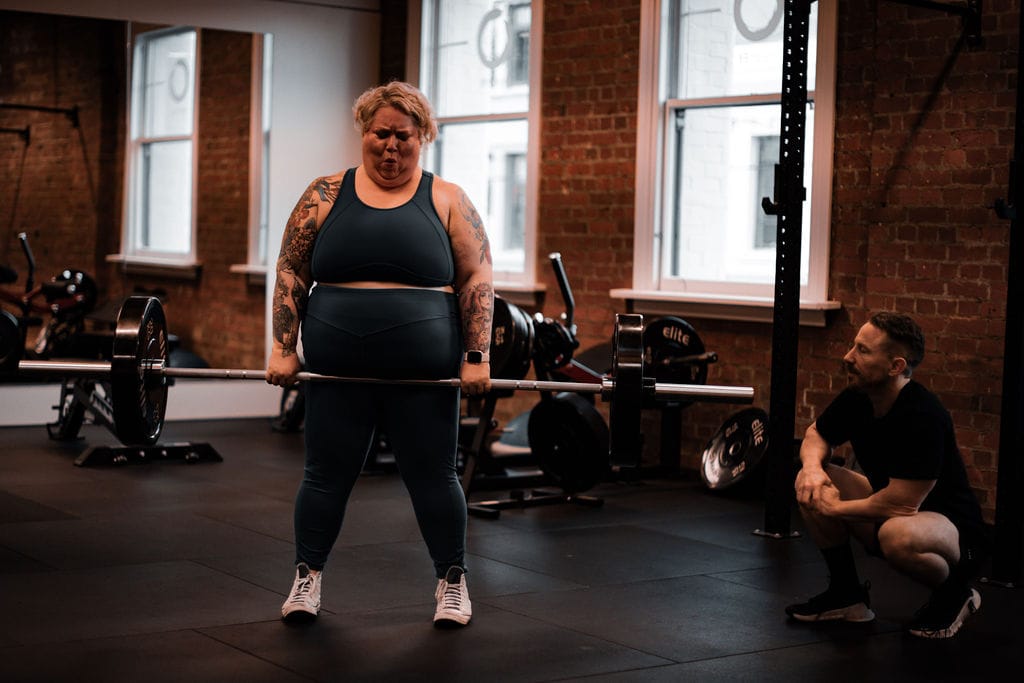
Carl: And then with the bench press, the bar has to remain still for a moment before you push it back up, is that right?
Mon: Yeah, how long the pause takes on bench is up to the referee. It’s actually a pretty full-on job—there’s a lot to look at during the bench press. You’ve got one ref on either side and a centre ref at the front who makes the calls.
I’ve written out the bench press commands before because they can be tricky—especially since most people don’t train for them. A lot of us bench quite fast in training, but in powerlifting, it has to be really controlled.
So when you unrack the bar, you have to hold it and clearly show that you're in control. Then you lower it to your chest—and wait. The ref is looking for the bar to be completely still and stable on your chest before they give the press command. If it’s wobbling around at all, they’ll wait.
Carl: You can’t bounce it off your chest or anything like that.
Mon: No, definitely not. You’d get a no-lift for that.
Megan: And it has to go up evenly, right? I saw someone fail a lift because one arm came up before the other. I was like, that should count!
Mon: Yeah, it’s not just about the bar moving—it’s how it moves. Across all the lifts, you’re not allowed any double movement. Whether it’s the squat, the bench, or the deadlift, once the bar starts moving up, it has to keep moving in that direction.
If it goes up, then down a little, and then back up again—that’s considered double movement. And that’s a no-lift.
It's a perception thing, so there's there's nothing wrong. Some people do do a lopsided bench press and one side goes up and then the other one follows and there's lot. But it can be a trick of the eye that if the side goes up, it looks like this one went down but did it?
Megan:What about the hip hinge? That’s probably the part I’m most worried about. How do you actually judge depth in a squat?

Mon: You’re looking for the hip crease—(pause)Hang on, I’m going to stand on my chair so I can show you.
Carl:Please don’t fall!
[Obviously this bit was quite visual, so here’s Mon’s written explainer:
Hip crease below the top surface of the knee is what referees are looking for. It is in your interest not to let baggy shorts or T shirt obscure your hip joints - I would go so far as to tuck my T-shirt in to be sure.]
Mon: It can be quite hard to read depth on larger bodies.
Megan: Yeah, it’s hard to see the hip crease clearly.
Mon: Exactly. And if your belly gets in the way, or there’s not much contrast between your clothes and your skin, it can be tricky. You want to help the referee out by making that crease as visible as possible.
That usually means pulling your clothing up—yep, right into the crotch, basically.
Megan: 😳
Mon: Not too much! But you do see people who feel a bit shy about it. They pull their clothes down or loosen their T-shirts, trying to be modest. But the thing is, by doing that, you’re actually making it harder for the referee to judge your depth accurately.
So, modesty’s great—but you’ve got to balance it with letting the ref see what they need to see.
Megan: So first we weigh in—which is basically just making sure we’re in the right weight class. That part’s fine for me, because I’m well and truly in the top weight class.
Mon: Yeah, top weight class—you’re good to go.
Megan:And then we do the gear check. What are they actually checking?
Mon: They check pretty much everything you're going to wear on the platform. The only things they don’t really care about are your underwear and the short socks you wear for squats or bench. Everything else—your shoes, belt, wrist wraps, knee sleeves, soft suit—they want to see it all.And yes, you do have to wear shoes for deadlift. Some people prefer lifting barefoot, but in competition, that’s not allowed. They're just making sure you’re aware of that.

Carl: Do they have rules about the type of shoe?
Mon: Not really, no. The only rule is if you’re wearing a heeled shoe—like squat shoes—there’s a maximum heel height. But honestly, most commercial squat shoes are well within that limit. They just want to make sure your gear complies.
Across the board, they’re checking that everything is in good condition. The IPF is one of the stricter federations when it comes to gear—so, no holes, no raggedy old stuff.
Megan: And for deadlift, you have to wear long socks, right?
Mon: Yep, knee-high socks that cover your shins. Nothing fancy—just regular socks that go up to your knees.
Megan: Why’s that?
Mon: It’s mostly hygiene. If you scrape your shins during deadlifts, the socks help keep blood off the bar.
There's always heaps of people rushing off to The Warehouse and waiting outside for it to open so they can buy some rugby socks.
You go to a table and the officials go through your gear item by item, checking each thing off on a form. They’ll ask to see everything—your socks, shoes, T-shirt, shorts—and they’ll make a note that each item has been approved.
If you wear a belt, they’ll check that too. I can’t remember off the top of my head if, at a novice comp, the belt has to be IPF-approved—but if it does, that info will be in your competition email. If it needs to be on the IPF-approved list, then it has to meet very specific requirements.
Megan: And then there’s something about attempt cards?
Mon: So at weigh-in, you go into a small room—usually with one or two referees. Even if they don’t look like it, they’re probably qualified refs helping out in another role.
They’ll weigh you and note your bodyweight with very little fuss. Then they’ll ask for your openers—your planned first attempts for squat, bench, and deadlift. You just need to bring those in with you—either written down or on your phone. That’s all you really need for weigh-in.
They’ll enter those numbers into a spreadsheet, which becomes your first attempt card.
You’ll also be given a little stack of attempt cards—about the size of business cards. They’re usually in your lifter’s bag or handed to you at check-in. A good early task is to write your name on all of them so you’re not scrambling later. Your handler will use these at the platform.
Megan: And you can change your opener if needed, right?
Mon: Yep. If you start warming up and realise your planned opener doesn’t feel right, you can change it—right up until three minutes before your flight starts. That means the start of your group’s first lift, not just your individual turn.
So if your flight starts at 9:00am, they’ll just start at 9. No big announcements. You’ll suddenly hear, “Bar is loaded!” and it begins. It can feel quite subtle—there’s not a lot of fanfare.
Carl: And what’s the handler’s role at that point?
Mon: The most important job your handler has is to support you on the platform. They’ll make sure you’re not wearing anything disallowed—like headphones—and get you set to walk out.
They also help track whether your lift was successful. You want to know if you got 3 white lights (perfect), or 2 white lights (still a pass).
And they handle attempt changes between lifts using those little cards. As soon as your lift is finished and the lights go up, a 1-minute timer starts. That’s your window to submit your next attempt. So your handler should be standing right at the side of the platform with your attempt cards, ready to go.
You’ll say, “That was 100, the plan was 110—stick with it?” or “That felt too easy—go to 112.5?” It doesn’t matter whether the lifter or the handler initiates the change, as long as it’s clear and fast.
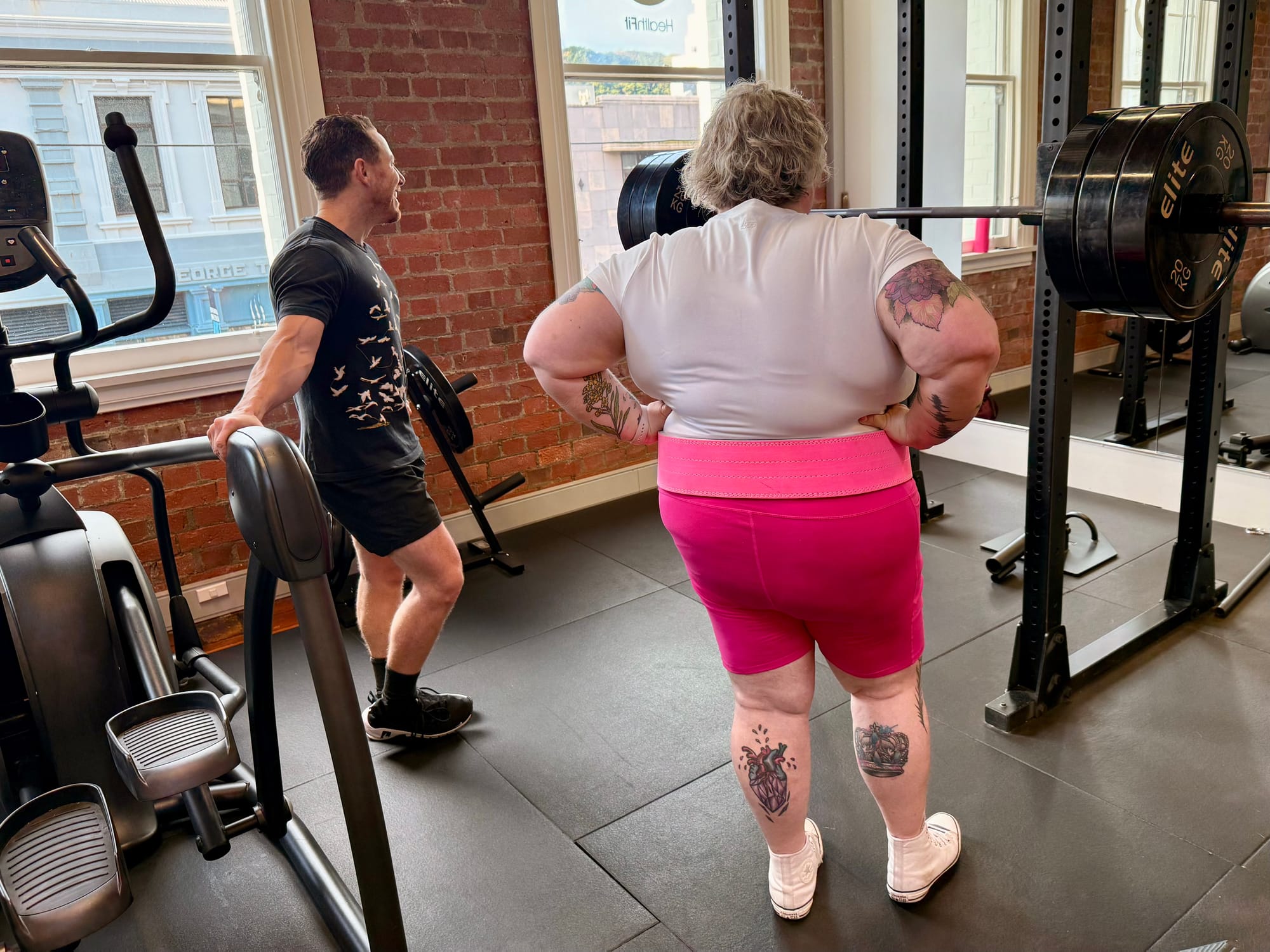
Megan: And what about warm-ups? That’s something I always wonder about.
Mon: I write all my warm-ups down. I know exactly how I like to start: what weight I open with, what I jump to next. Because on comp day, you’ll see someone doing something new or interesting—rolling on the floor, doing leg swings—and it’s so easy to get distracted. You think, “Wow, they look clever, I’ll try that too!” But if it’s not part of your usual routine, don’t suddenly throw it in.
Carl: Stick to your defaults.
Mon: Exactly. Comp day has enough variables already—gear check, weigh-in, nerves, unfamiliar venues. Keep everything else as close to normal as you can. Writing it down helps me come back to centre.
Megan: And warm-up spaces are shared too, right?
Mon: Yes, you’ll need to work in with other people. Often you end up gravitating toward someone around your height for squats—that way you don’t have to keep changing the rack height. But they might be lifting way more or less than you, and doing totally different increments.
It’s really easy to get caught up in what they’re doing and think, “Oh, I guess I’ll take that jump too.” But if you’ve planned 60 kilos next, then do 60 kilos. Stick to your plan.
Megan: And we only have like a minute to tell them our next attempt?
Mon: Yeah, you and the attempt person just scribble down “112.5,” hand it over—job done. At novice competitions, they’re pretty generous. They’ll chase after you if you forget and say, “Come back, you have to put in your next attempt!”
But at a formal competition, it’s different. If you walk away and don’t submit a number within one minute, they’ll automatically put your next attempt up by 2.5kg. That’s the default. And if you’re not back in time—timeout.

Megan: One of the things I read is that at a proper competition—a formal one—this is where it gets really interesting. Because if you're jostling for placings, it becomes strategic. Like, do I go up by 5? Or by 7.5? Because you’re trying to beat the other person, right?
Mon:Yeah, yeah, exactly. You won’t need to worry about that just yet—but attempt selection is really interesting. That’s why it’s worth planning in advance.
You might have an idea of a “maximal goal” in your head—something that would feel awesome to hit. And if it’s something you haven’t done before, you really need to work backwards from that.
So let’s say your dream third attempt is somewhere between 115 and 120. You’ve got to ask yourself: how do I get there? How big am I comfortable jumping?
I call them jumps—some people say increments. It’s personal. Some lifters can go up by 20 or 30 kilos. For me, 10kg is my max jump. So you look at your goal and work back: what do my first and second attempts need to be to give me the best shot?But you also need to find the right opener. The idea of an opener is that it’s a bit of a challenge—but you will get it. You want to choose something that’s solid and reliable.
Carl:So it's something you’ve done a few times before, right?
Mon: Yeah, exactly. The dream opener—especially for a first competition—is something you could do for a double. It should feel controlled, familiar, and confidently within reach. You want to walk away from your first lift feeling successful and settled.
Once you're in—you can't go down. You can’t lower your attempt after it's been submitted.
If you don’t get your opener, you’re allowed to repeat the same weight—but you have to tell the desk, otherwise they’ll automatically increase it by 2.5kg. That’s the default.
So that’s why your first attempt matters so much. It sets the tone. You want to get on the board early and build confidence from there.
And that’s why it’s kind of nice to open with something that feels really manageable. You might still get red lights from the ref—maybe they say, “You didn’t do X properly”—and that’s okay. You can take that feedback and adjust.
But if you’re thinking, Oh no, that was really heavy and I didn’t follow the rules, then repeating it can feel a lot harder the second time around.
Megan: Presumably because it’s a novice competition—but if you do get red lights, are they going to tell you why?
Mon:Yeah, absolutely. At any competition, if you want to know why you got red lights, the referees are happy to tell you—you just have to ask them straight away.
Megan: OK, big question: Am I going to want to keep doing it, Mon? I mean, there's no way to answer that question, but…
Mon:Not immediately. That’s probably one of the main things I tell people—right after a comp, it’s not usually this big euphoric high. It’s nearly physically tiring, but not quite. What it really is, is neural fatigue.
Carl: Yeah, that’s a really good point—even with training.
Mon:Yeah. I used to talk to Kristen from Fiercely Fueled Nutrition about this—I told her, “I find it so hard to get enough food in on competition day because I’m nervous and not really thinking about eating.”
And she said, “You don’t need much.”Calorically, you’re not using heaps during a competition. It’s really efficient. You’re not doing sets of 10—you’re just doing what’s necessary to warm up and lift.
Carl: It’s so anaerobic.
Mon: Exactly. Just what you need—and nothing more. But your brain? That’s what needs fuel. If you don’t give it enough glucose, that’s what taps out first—not your body.
Mon: That was your question—whether you'll want to keep doing it.
Megan: Yep.
Mon: So yeah—it's really neurally fatiguing. At the end of the day, after maxing out all three lifts, your nervous system is toast. There's even a name for it: post-comp blues. The next day can feel awful—like a hangover or jet lag.
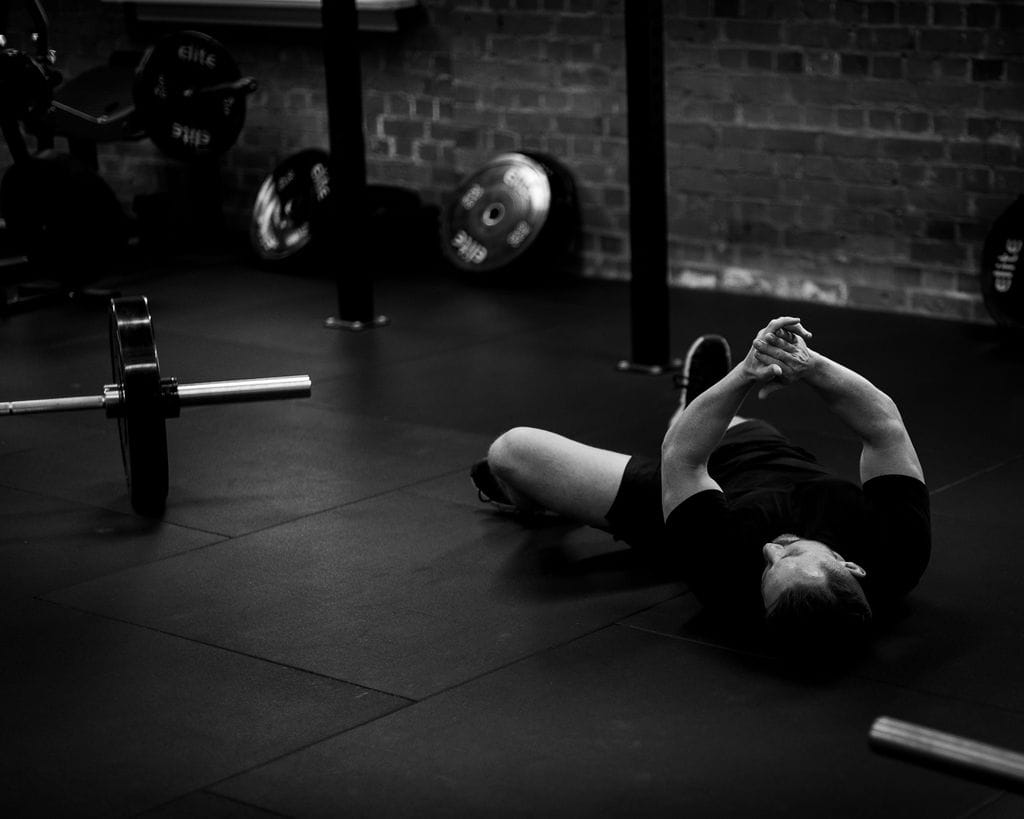
Hydration, electrolytes, and some good food can help. Just treat it like recovery.
But yeah, it’s really common to feel—over the next few days or even the next week—like, “I never want to touch a barbell again.” Not even compete—just like, lift. And it’s weird, because it hits after the fact.
In my earlier comps, I definitely felt that way. I’d think, “Yuck. I can’t imagine ever doing this again.”And then later, I started noticing that two days after competing, I felt neutral. Like, “Okay, I could go back to the gym tomorrow.”And then a few days after that, I’d slump again—“Actually, I don’t think I want to do this anymore.”
Megan: That’s really interesting.
Mon: Yeah, it’s the nervous system. The effects are deep and weird, and you don’t always see them coming.
Megan: I have one more question I just thought of— Is it different lifting in front of people?I’m so used to just being in the gym. I mean, I know there are people around, but I always assume they’re not watching me.
Mon: Honestly, I don’t really think about it. I’m not much of a performer—I don’t love doing things in front of people—but for some reason, this just doesn’t bother me.
Novice comps are small and super supportive. They’re quite niche. No one’s really coming along just for fun—everyone in the crowd is usually a friend or family member of someone competing.
So no one’s paying that much attention to anyone who isn’t their person. But they’ll still hear your name when the MC calls it, and they’ll go, “Yeah, go Megan!” or whatever. It’s a really low-pressure vibe. Quietly encouraging.
–-
Hopefully this conversations was quietly encouraging too! We’re all noise cancelling headphones and candy and electrolytes now, but we will report in with a special edition tomorrow.
Cool stuff we saw this week
(Megan) NGL, I sometimes do bicep curls and visualise Linda Hamilton's arms in Terminator 2. If I could manifest anything....
(Megan) Sometimes I wonder if we overcomplicate this whole exercise thing (we do, I don't wonder, I am not Carrie Bradshaw), so you better believe that when i saw the subject "does rep range matter," I clicked real fast. According to this one study...not so much. (Training to failure does tho!)
(Megan) If I was one of those weird billionaires obsessed with living to 200, I wouldn't be, you know, transfusing myself with my offspring's blood, I would fund research into myokines.
(Megan) The other thing we overthink? Protein. However, 5 protein mistakes you might be making. (WaPo gift link)
(Megan) One of the weirder things that has happened to me since joining the gym is that it has become my go to thing when I am stressed. Sorry to the rosé makers of the world. (NYT gift link)
